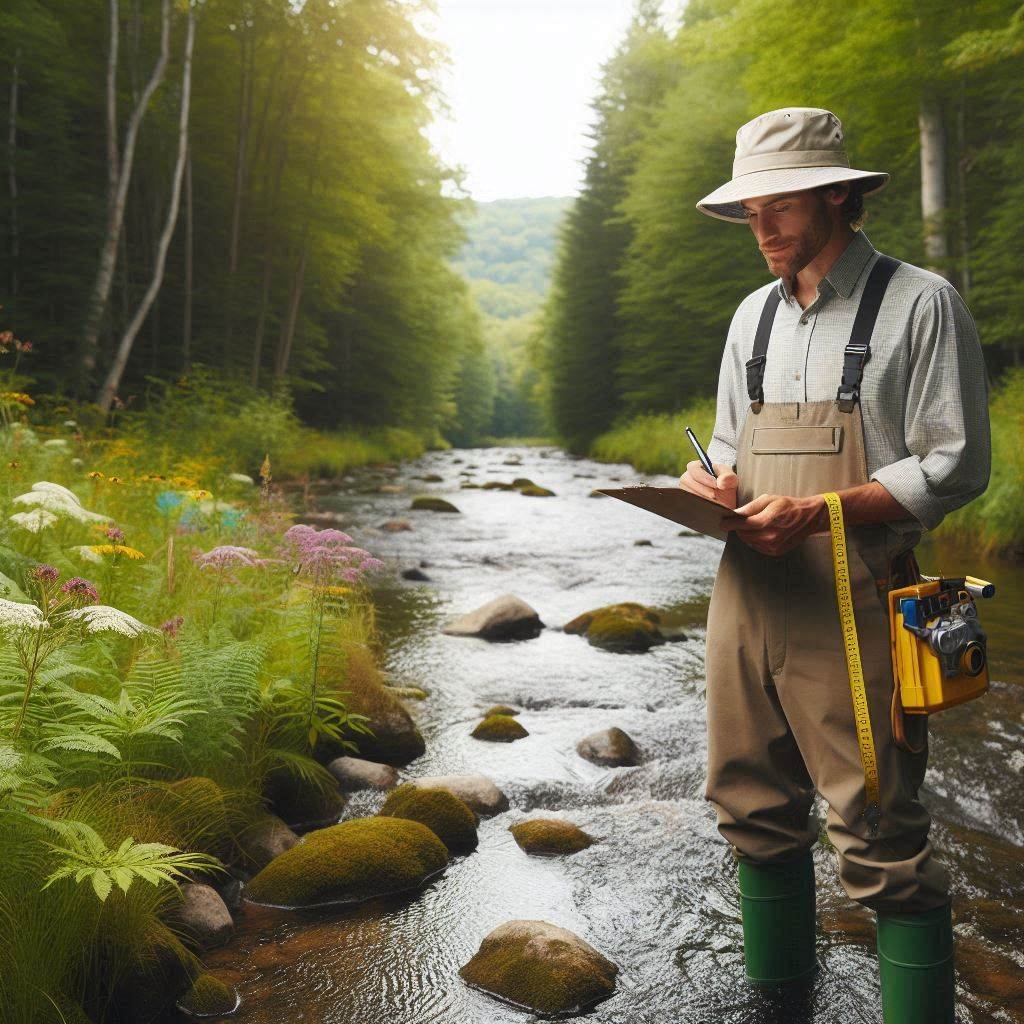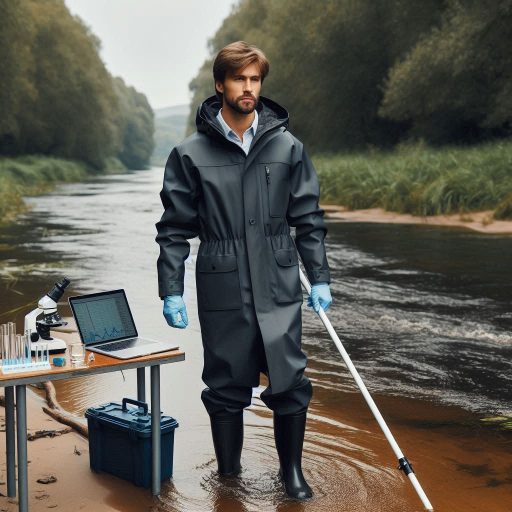Introduction
Hydrology is the scientific study of the distribution, movement, and properties of water in the environment.
This field plays a crucial role in understanding our planet’s water systems, which are essential for sustaining life.
Hydrologists analyze water cycles, groundwater reserves, and the effects of climate change on water resources.
Their work informs essential decisions related to water management, flood prediction, and ecosystem preservation.
Choosing a top university for hydrology programs is vital for students pursuing a career in this field.
Attending a respected institution provides rigorous coursework and access to renowned faculty.
Leading universities often feature cutting-edge laboratories, enabling students to engage in practical research.
This hands-on experience is invaluable for developing essential skills and knowledge.
Graduating from a well-regarded hydrology program can significantly impact one‘s career trajectory.
Employers often seek candidates with degrees from recognized institutions, as they tend to have strong analytical and technical skills.
Choosing a top university provides a strong foundation for a successful career in hydrology and environmental science.
It equips students with essential tools to tackle pressing global water challenges.
Read: Organizations & Associations for Environmental Scientists in the USA
Overview of Hydrology Programs
What hydrology entails
Hydrology is the study of water in the environment.
It focuses on the distribution, movement, and properties of water.
This field plays a vital role in addressing water-related issues.
Hydrologists help manage water resources effectively, ensuring sustainable use.
Students in hydrology programs explore various topics.
They learn about the hydrological cycle, water quality, and groundwater management.
Programs also cover surface water, climate change, and hydrological modeling.
This interdisciplinary field integrates knowledge from geology, meteorology, and environmental science.
Skills and Knowledge Gained
Hydrology programs emphasize critical skills for future professionals.
Students develop strong analytical and problem-solving abilities.
They learn to interpret complex data and make informed decisions.
Programs also enhance communication skills, enabling students to present findings clearly.
Hydrologists often collaborate with engineers, planners, and policymakers, making effective communication essential.
Technical skills are also crucial in hydrology.
Students become proficient in using geographic information systems (GIS) and remote sensing tools.
These technologies help analyze spatial data related to water resources.
Additionally, students gain experience in data collection and fieldwork.
They learn how to conduct experiments and assess water quality.
Career Opportunities in Hydrology
Career opportunities in hydrology are diverse and rewarding.
Graduates can work in various sectors, including government, consulting, and academia.
Many hydrologists find positions in environmental agencies, where they monitor water quality and assess resources.
These professionals also engage in research and policy development.
In the private sector, hydrologists often work for consulting firms.
They provide expertise on water resource management and environmental impact assessments.
These roles involve evaluating projects, ensuring compliance with regulations, and developing sustainable solutions.
Hydrologists also play key roles in disaster management and mitigation.
They assess flood risks and help communities prepare for extreme weather events.
Academics and research positions are also available for hydrology graduates.
Many choose to pursue advanced degrees and contribute to scientific knowledge.
They often work at universities, conducting research and teaching future students.
Some professionals focus on innovative technologies for water resource management.
They explore new methods for conserving water and improving quality.
Overall, hydrology programs equip students with valuable skills.
Graduates emerge as capable professionals ready to tackle pressing water issues.
They contribute to sustainable water management and environmental protection.
The demand for skilled hydrologists continues to grow, promising a bright future in this field.
Hydrology is not just a career; it is a commitment to preserving our planet’s vital resources.
Read: U.S. Cities with the Most Opportunities for Environmental Scientists
Criteria for choosing a top university for hydrology programs
Accreditation and Reputation of the University
When selecting a university for a hydrology program, one of the most critical factors to consider is the accreditation and overall reputation of the institution.
Accreditation ensures that the university and its programs meet the highest academic standards, which are recognized both nationally and internationally.
Attending an accredited institution ensures that your degree will be respected and valued in the professional world, opening doors to various career paths.
In addition to accreditation, the reputation of the university plays a significant role in shaping your future opportunities.
Attending a university with a strong reputation in hydrology gives students distinct advantages.
These include access to better faculty, increased funding, and more research opportunities.
Ultimately, both accreditation and reputation should weigh heavily in your decision-making process when choosing the right university for your hydrology studies.
Faculty Expertise and Research Opportunities
The expertise of the faculty in a hydrology program can have a profound impact on the quality of education that students receive.
Leading universities in hydrology employ highly regarded faculty with expertise in academic research and practical applications.
These experts possess extensive backgrounds, contributing to their strong reputations in the field.
Faculty expertise is critical because it directly influences the learning experience in the classroom.
Professors with deep knowledge of hydrology can provide unique insights and up-to-date information on the latest advancements in the field.
Additionally, students benefit from being able to work closely with professors who are actively involved in ongoing research projects.
These research opportunities are invaluable for students looking to gain hands-on experience in hydrology.
Participating in research projects helps students apply theoretical knowledge to real-world challenges.
It develops critical thinking skills and provides practical experience. Students gain hands-on skills in data collection, analysis, and problem-solving.
Faculty members engaged in research often mentor students, guiding them through academic and professional development complexities.
They help students identify their interests, develop research proposals, and navigate academic publishing and presentations.
Overall, the expertise of the faculty and the availability of research opportunities are essential components of a high-quality hydrology program.
Facilities and Resources for Hydrology Research
Top-tier universities offer students state-of-the-art facilities and resources for both theoretical and practical learning in hydrology.
Hydrology is a field that requires a deep understanding of physical processes, data analysis, and modeling.
Therefore, having access to advanced laboratories, field equipment, and computing resources is essential for students pursuing a career in this field.
Leading universities in hydrology provide well-equipped labs for students to conduct water quality and fluid dynamics experiments.
Students also study sediment transport and soil moisture content using advanced equipment in these specialized laboratories.
Field stations allow students to conduct on-site research in natural environments.
They study hydrological systems in real time.
Field experiences help us understand how water moves through various landscapes.
They reveal how human activities impact water resources.
Additionally, these experiences guide us in designing sustainable water management strategies.
Beyond laboratories and field stations, access to powerful computer modeling tools is another crucial resource for hydrology students.
These tools enable students to analyze data, predict future water flows, and assess the impacts of climate change or human interventions on water systems.
With the right facilities and resources, students can gain a comprehensive understanding of hydrology that prepares them for successful careers in the field.
Internship and Networking Opportunities
Internships and networking opportunities are vital components of any high-quality hydrology program.
Practical experience is essential for students to apply the theoretical knowledge they have learned in the classroom to real-world situations.
Many top universities partner with government agencies, research organizations, private environmental consulting firms, and NGOs.
These partnerships provide valuable internships for hydrology students.
Internships offer students invaluable opportunities to work with professionals in the field.
They gain hands-on experience and deepen their understanding of hydrological principles.
Moreover, many universities host conferences, seminars, and networking events that bring together students, faculty, and professionals in the field of hydrology.
These events enable students to engage with leading experts.
They learn about the latest trends and developments in the field.
Students also present their research findings to a broader audience.
Building a professional network during your time at university can open doors to research collaborations, internships, and full-time positions after graduation.
Therefore, when selecting a university for hydrology, it’s essential to consider the strength of its internship programs and networking opportunities.
Alumni Success Stories
One of the best ways to assess the quality of a hydrology program is by looking at the success stories of its alumni.
Universities with strong alumni networks often produce graduates who go on to have successful and impactful careers in the field.
Researching the career paths of alumni can provide valuable insight into the effectiveness of the education and training provided by the university.
Successful alumni often hold prominent positions in government agencies, research institutions, environmental consulting firms, and academic organizations.
Their achievements reflect the university’s ability to prepare students for leadership roles in hydrology and related fields.
Alumni success stories showcase the program’s quality.
Graduates receive recognition for their contributions to water resource management, environmental protection, and sustainable development.
Consider accreditation, reputation, and faculty expertise when choosing a university for a hydrology program.
Evaluate research opportunities and facilities as well. Look into internship options and alumni success stories.
All these factors play a critical role in your decision.
Each of these elements plays a significant role in shaping the educational experience and preparing students for successful careers in the field of hydrology.
By carefully evaluating these factors, prospective students can make informed decisions.
This approach sets them on the path to achieving their academic and professional goals in hydrology.
Read: Environmental Scientist vs. Ecologist: Roles and Differences in the US

Uncover the Details: Ecologist Salary Insights and Career Growth in America
Top universities for hydrology programs in the USA
University of California, Berkeley
Overview of the Hydrology Program
The University of California, Berkeley, is renowned for its top-notch hydrology program, which is a part of the College of Natural Resources.
The program equips students with a comprehensive education in hydrology.
Students explore groundwater flow, surface water hydrology, and water quality management.
The curriculum blends theoretical knowledge with practical applications.
Students gain hands-on experience through laboratory work, field studies, and real-world projects.
Emphasis is placed on understanding hydrological processes and their relationship to environmental issues, water resource management, and sustainability.
Faculty Expertise and Research Opportunities
The faculty members at UC Berkeley are leading experts in the field of hydrology and water resources.
Professors conduct extensive research on critical challenges.
They tackle issues like climate change impacts and sustainable water use.
They develop innovative water management strategies to address these challenges.
Students can explore numerous research opportunities in cutting-edge projects.
They can study urbanization’s impacts on hydrology. may develop sustainable groundwater management practices.
They will utilize advanced modeling techniques to predict hydrological behavior.
Collaborating with local agencies and environmental organizations enhances students’ research experiences.
These partnerships provide unique insights into real-world water issues.
Alumni Success Stories
UC Berkeley’s alumni have gone on to achieve great success in the field of hydrology and related disciplines.
Many graduates have secured prestigious positions at renowned research institutions, government agencies, and environmental consulting firms.
Notable alumni include leaders in academia, policy-making, and industry.
They significantly advance hydrology and water resource management.
UC Berkeley‘s alumni share success stories that showcase the quality of its education and training.
These stories reflect the university’s commitment to preparing professionals for complex challenges in hydrology.
Colorado State University
Overview of the Hydrology Program
Colorado State University (CSU) offers a comprehensive hydrology program that emphasizes both theoretical knowledge and practical skills.
The program is designed to equip students with the understanding of hydrological processes necessary for addressing contemporary water management issues.
Students explore topics such as hydrologic modeling, watershed management, and water quality assessment.
The curriculum is structured to promote critical thinking and problem-solving, essential skills in the evolving field of hydrology.
Facilities and Resources Available for Hydrology Research
CSU offers students access to state-of-the-art laboratories and field equipment.
They utilize extensive research facilities for advanced hydrology research.
Resources like the Hydro-Environmental Research Laboratory and the Center for Hydrology and Water Quality offer students hands-on experience.
These facilities allow students to engage in innovative projects.
The university also promotes interdisciplinary collaboration, allowing students to work alongside experts in environmental science, engineering, and policy.
Internship and Networking Opportunities
CSU actively fosters internship and networking opportunities for hydrology students.
The university maintains strong connections with government agencies, research institutions, and private companies in the water sector.
These partnerships provide students with valuable hands-on experience and exposure to real-world challenges in water management.
Internship placements often lead to job offers post-graduation, as students build professional networks while gaining relevant work experience in their field.
Transform Your Career Today
Unlock a personalized career strategy that drives real results. Get tailored advice and a roadmap designed just for you.
Start NowAlumni Success Stories
Graduates from CSU’s hydrology program enjoy a high success rate in securing employment in the field.
Many alumni have gone on to work in prestigious positions at environmental consulting firms, water management agencies, and research organizations.
Their achievements highlight the quality of education and training at Colorado State University.
The university commits to preparing students for impactful careers in hydrology and water resources.
University of Washington
Overview of the Hydrology Program
The University of Washington (UW) offers a highly regarded hydrology program, known for its rigorous curriculum and ample research opportunities.
Students receive a solid foundation in hydrological principles, water resource management, and environmental sustainability.
The program emphasizes interdisciplinary approaches.
It encourages students to consider economic, social, and environmental factors.
Students address complex water-related issues effectively.
This holistic perspective prepares students to be effective problem solvers in diverse professional settings.
Accreditation and Reputation of the University
UW is a prestigious institution with a strong reputation for excellence in research and education.
The university‘s hydrology program is accredited by leading organizations in the field, ensuring that students receive a high-quality education that meets industry standards.
UW‘s commitment to academic excellence and innovation sets it apart as a top choice for hydrology studies.
The program is regularly updated to reflect the latest research and industry trends, ensuring that students are well-prepared to enter the workforce upon graduation.
Alumni Success Stories
Alumni from the University of Washington’s hydrology program have achieved remarkable career success.
They contribute significantly to hydrology through research, policy work, and industry leadership.
Graduates work at leading environmental organizations, government agencies, and research institutions.
They influence water policy and management practices.
Their accomplishments showcase the value of a UW degree.
They highlight the impactful learning experiences the university offers.
This solidifies UW’s reputation as a leader in hydrology education.
Read: The Relationship Between U.S. Policy & Environmental Scientist Roles
Benefits of Studying Hydrology at a Top University
Studying hydrology at a top university offers numerous advantages.
Here are some of the key benefits:
Quality Education and Training
- Expert Faculty: Top universities employ faculty with extensive knowledge and experience in hydrology.
Their expertise enhances the learning experience. - Comprehensive Curriculum: Renowned programs provide a well-rounded curriculum.
Students gain a solid understanding of hydrological processes and systems. - Hands-on Learning: Leading universities emphasize practical experiences.
Students participate in fieldwork, lab work, and real-world projects. - Accreditation: Attending an accredited university ensures a recognized degree.
This recognition increases job prospects and enhances credibility in the field. - Interdisciplinary Approach: Top programs often incorporate related fields like geology, environmental science, and engineering.
This interdisciplinary perspective enriches understanding and application of hydrology.
Access to Cutting-Edge Research and Technology
- Innovative Research Facilities: Top universities invest in state-of-the-art laboratories and equipment.
Access to advanced tools enhances research capabilities and learning opportunities. - Ongoing Research Projects: Students can participate in groundbreaking research projects.
These experiences allow them to apply classroom knowledge to real-world issues. - Collaboration with Experts: Students often collaborate with leading researchers in the field.
This exposure to current research trends is invaluable for career development. - Access to Databases and Resources: Renowned institutions provide access to extensive research databases.
This access supports in-depth studies and data analysis. - Opportunities for Publication: Students may have the chance to publish their research.
Publishing enhances their resumes and builds their professional profiles.
Networking Opportunities with Industry Professionals
- Industry Partnerships: Top hydrology programs often have partnerships with government agencies and private firms.
These partnerships facilitate internships and job placements. - Alumni Networks: Renowned universities boast strong alumni networks.
Networking with alumni can lead to job opportunities and mentorship. - Conferences and Workshops: Top universities frequently host industry conferences.
Students can attend these events to connect with professionals and expand their networks. - Guest Lectures and Seminars: Many programs invite industry experts to speak.
These events provide students with insights and opportunities for engagement. - Internship Opportunities: Studying at a top university often leads to exclusive internships.
These internships allow students to gain practical experience and establish valuable connections.
Choosing a top university for hydrology offers significant benefits.
Quality education, access to advanced research, and networking opportunities provide a strong foundation for a successful career in hydrology.
Students can leverage these advantages to make meaningful contributions to the field and tackle pressing environmental challenges.
Conclusion
Choosing a top university for hydrology programs is crucial for a successful career in this field.
The reputation and quality of education offered by these institutions can significantly impact your future prospects.
Explore the top universities mentioned in this post for hydrology studies to gain valuable knowledge and experience.
Each of these universities offers unique programs and resources that can help you excel in the field of hydrology.
Remember, pursuing a career in hydrology is an opportunity to make a real impact on our environment and society.
By choosing the right university and dedicating yourself to your studies, you can become a skilled professional in this vital field.
Don’t underestimate the importance of education and the role it plays in shaping your future.
As you embark on this journey, keep in mind this quote by Ralph Waldo Emerson: “The mind, once stretched by a new idea, never returns to its original dimensions.
” Education has the power to transform lives and change the world.
[E-Books for Sale]
The Big Book of 500 High-Paying Jobs in America: Unlock Your Earning Potential
$19.99 • 500 High-Paying Jobs • 330 pages
Explore 500 high-paying jobs in America and learn how to boost your career, earn more, and achieve success!
See All 500 High-Paying Jobs of this E-Book
1001 Professions Without a Degree: High-Paying American Jobs You Can Start Now
$19.99 • 1001 Professions Without a Degree • 174 pages
Discover 1001 high-paying jobs without a degree! Unlock career tips, skills, and success strategies for just $19.99!




